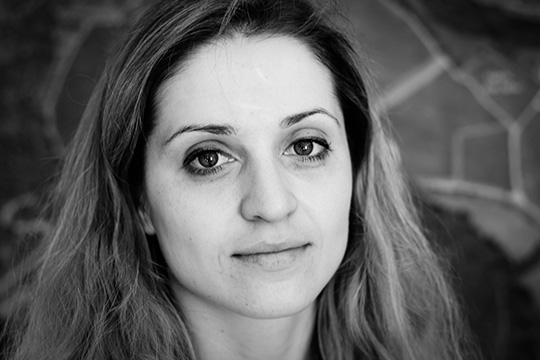
In 1998 the Pizzolo family restored an old vineyard in the rural hills of Abruzzo. The vineyard was nestled in a valley surrounded by the mountains, located in the green heart of Abruzzo. Valle Reale’s vineyards are situated inside one of Italy’s most beautiful national parks. The vineyards have thin, rocky soils rich in limestone, with a light base of clay and sand. The proximity to the Gran Sasso mountain range, and the altitude of the estate itself, create wide fluctuations in temperature between day and night.
Valle Reale practices organic viticulture and non-interventionist winemaking. Their wines have a rustic elegance to them that reflects the mountainous regions of Abruzzo where they originate. Eric Asimov, writing on Montepulciano d'Abruzzo in his New York Times Wine School, praised the Valle Reale Montepulciano as "lively and fresh, with earthy flavors of dark fruits."
Grape Collective talks with Valle Reale General Manager Giulia Migliorati about the winemaking path of Valle Reale and the uniqueness of the Abruzzo region.
Christopher Barnes: Giulia, tell me a little bit about Valle Reale. When did it start?
Giulia Migliorati: It started in 1999, founded by our owner Leonardo Pizzolo. He came here from Verona, so he's from the north of Italy, and he came down here to found his own winery from an ancient vineyard that his family had already owned for a few years. He had this vineyard and he wanted to start his own business. So, he did this first vineyard in the year 2000, and by always following a path of quality and respect for terroir and organic and biodynamic viticulture and wild yeast. So, of course, during these years we see a development in the winery and in the quality of our products and in our philosophy. But, always in the respect of quality and terroir, which is for sure our main focus, forever.

(Valle Reale General Manager Giulia Migliorati photographed by Piers Parlett)
We only work with native grapes; Trebbiano for white wine and Montepulciano for red and rosé wine. And since the year 2007, only with spontaneous fermentation. So, all our wines are fermented with wild yeast. So we produce a lot of single vineyard wines, and only from one parcel, then we harvest the parcel all together, and from that parcel we produce only one wine, that carries the name of the parcel. For example, the name of the parcel is named after a location, the name of that place, and the wine will have the same name.
And you're in a very interesting part of Italy. You're right in a national park. So, even if you wanted to spray chemicals, you really couldn't, could you?
Correct. So, you have to know that we are in Maiella National Park. Exactly located within this park. And we border with three other main national parks: Parco Nazionale d'Abruzzo, Gran Sasso National Park, and Sirente Velino Park. So it's not possible for us to work with conventional agriculture. We only can work with organic treatments and organic ways of cultivating. So since the beginning we can say that we are organic. Then later on, after the foundation, like in the year 2009 I think, we applied for the organic certification. That arrived three years later. But for sure we can say we are organic since the beginning because of the regulations of the park.
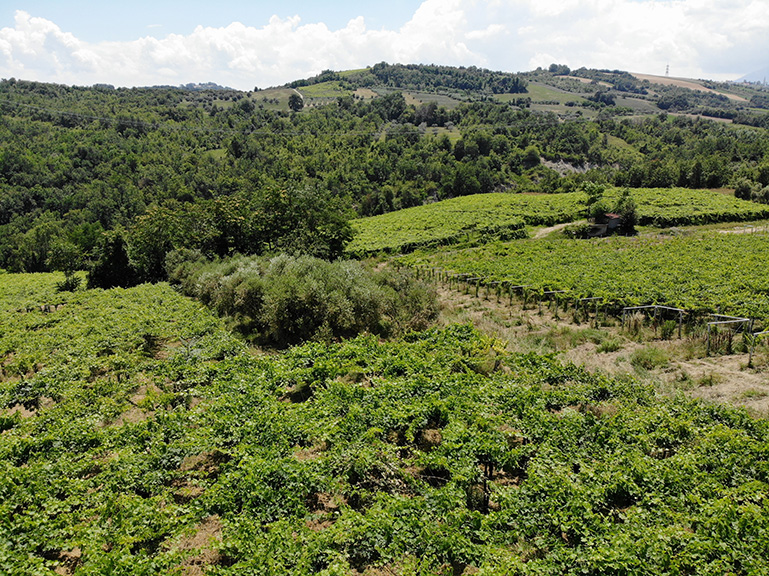 And you have to know that we are over one of the main sources of water of central Italy. So it's called Valle Reale because Valle Reale, which in Italian means "royal valley" is not the name of our wine, it is the name of the place. It's the royal valley. So also the source of water underneath us is named Valle Reale.
And you have to know that we are over one of the main sources of water of central Italy. So it's called Valle Reale because Valle Reale, which in Italian means "royal valley" is not the name of our wine, it is the name of the place. It's the royal valley. So also the source of water underneath us is named Valle Reale.
This source of water is bottled from a water bottling company right at the end of our estate. And of course it belongs to the San Benedetto group, one of the major water company groups in Italy. They check the water three times with an analysis. So for sure if one of the levels, sodium for example, in the water doesn't respect our law, they will understand that we did something strange to the vine, that right away entered into the water, into the source of water. So for sure we should stop immediately our activity.
Talk a little bit about the soils and the climate here, because you're in the mountains in Abruzzo, which is very, very different from producing wine in the coastal area. How are those two areas very different?
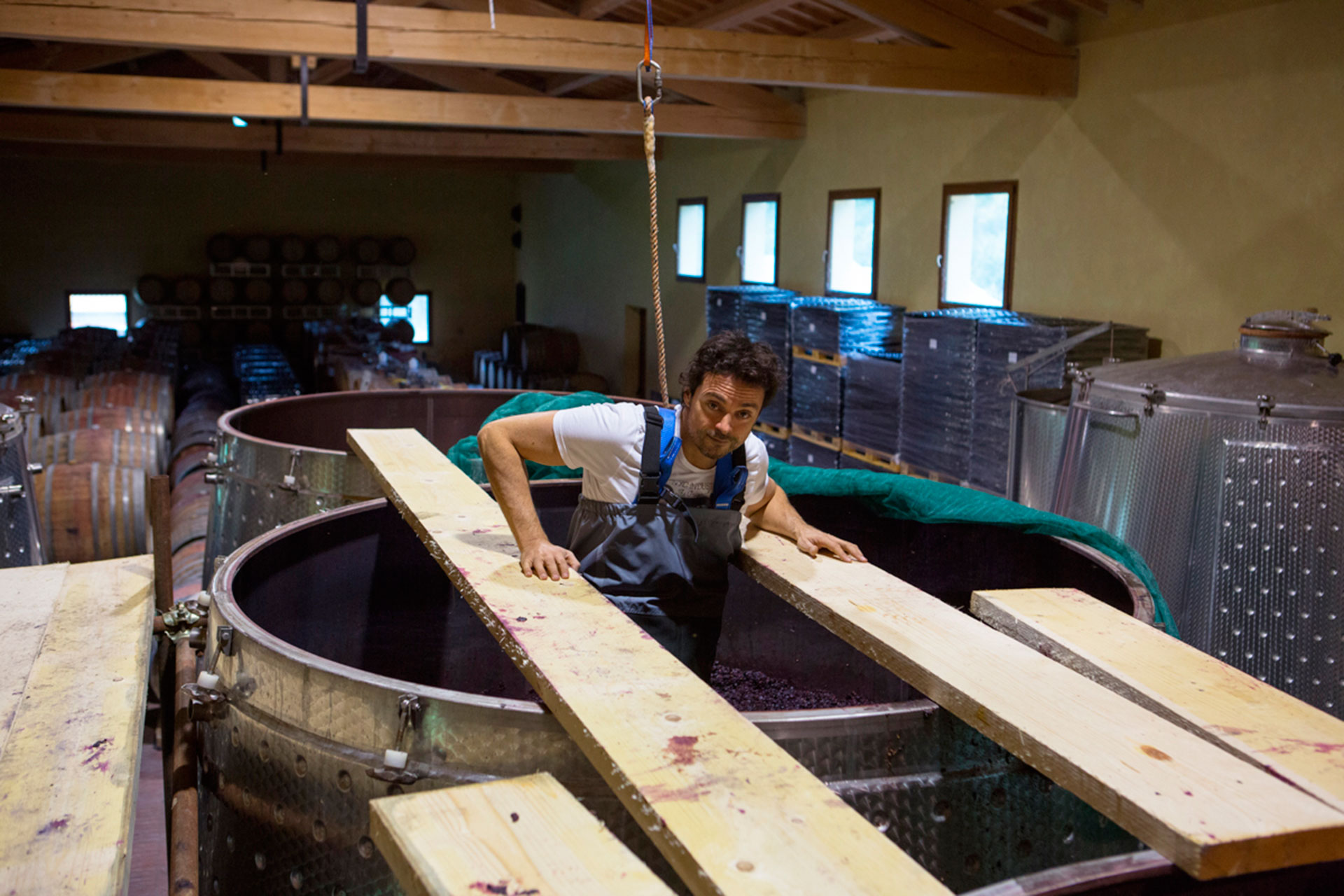 So we are in the mountainside of Abruzzo. Abruzzo is divided in two main areas: the mountainside and the coastal part. The mountainside which covers approximately two thirds of the entire region has a subcontinental climate. That's where we are. And only six wineries are there. In the coastal part instead we have a Mediterranean climate, and there are in the Montepulciano, approximately 480 wineries.
So we are in the mountainside of Abruzzo. Abruzzo is divided in two main areas: the mountainside and the coastal part. The mountainside which covers approximately two thirds of the entire region has a subcontinental climate. That's where we are. And only six wineries are there. In the coastal part instead we have a Mediterranean climate, and there are in the Montepulciano, approximately 480 wineries.
(Winery owner Leonardo Pizzolo stomping grapes)
The reason why is because in the coastal part, you are very close to the Adriatic Sea, which releases this warm breeze that keeps warm the entire coastal part day and night, without stopping. So when it's the maturation period of the grape, in spring and summer, you will have grapes that keep maturing and mature day and night, without stopping, because of the sea factor.
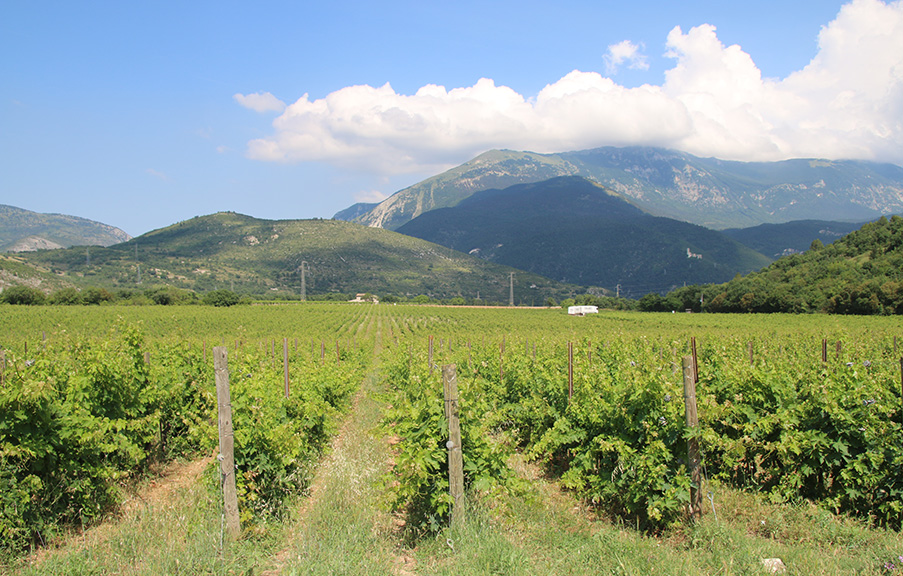 In our side, because we are divided from the coastal side by this huge mountain barrier, made of Gran Sasso mainly, Gran Sasso massif, and Maiella massif, the warm breeze from the sea is not able to pass the mountain barrier, and doesn't arrive here. And this is why our climate is called subcontinental. And this is also why we have for sure warm days, because this is central Italy and it's a warm latitude. But cold nights, because we don't have the warm breeze from the sea. So, during the night, the temperature drops down even 10, 12, 15 degrees, depending on the day. And this is why our grapes mature only during the day and not during the night. Of course at the end we will get half of the quantity with respect to our friends on the coast. Much smaller grapes, and a later harvest.
In our side, because we are divided from the coastal side by this huge mountain barrier, made of Gran Sasso mainly, Gran Sasso massif, and Maiella massif, the warm breeze from the sea is not able to pass the mountain barrier, and doesn't arrive here. And this is why our climate is called subcontinental. And this is also why we have for sure warm days, because this is central Italy and it's a warm latitude. But cold nights, because we don't have the warm breeze from the sea. So, during the night, the temperature drops down even 10, 12, 15 degrees, depending on the day. And this is why our grapes mature only during the day and not during the night. Of course at the end we will get half of the quantity with respect to our friends on the coast. Much smaller grapes, and a later harvest.
But if we refer to quality, in our opinion, the balance that you will get in the grape, so in the wine, is fantastic, because you have structure from the warm weather, acidity and aromatic bouquet from the cold weather.
So Giulia, the wine from the mountains is a little bit crisper, a little bit fresher than the wines in the coastal area. Is that a correct statement?
Yes. I would say that for sure, a very warm Mediterranean climate produces a very big, robust, powerful wine. Similar to wines in areas like Puglia or Calabria, the more southern region. In the mountains in Abruzzo for sure we go more towards the freshness and the acidity. This is the climate. This is not that one producer is good or bad. It's the difference in the terroir which is also what is great about wines.
Take a 360-degree virtual reality tour of the Valle Reale winery in Abruzzo, Italy. This experience only works in certain browsers including Google Chrome. You can also experience the VR tour directly on Youtube.
Giulia, talk a little bit about the soils and the climate here in the mountains.
So, subcontinental climate, I said, very stony soil. It's compared also to what our friends in the coastal area will have. So in the coastal part it's mainly sand and clay. But for us in the mountains, the stony component is the primary one, and then of course some clay. And of course, because our property starts at approximately 300 meters, and going up to 500 meters, the higher you go and closer to the mountains the stony component is bigger.
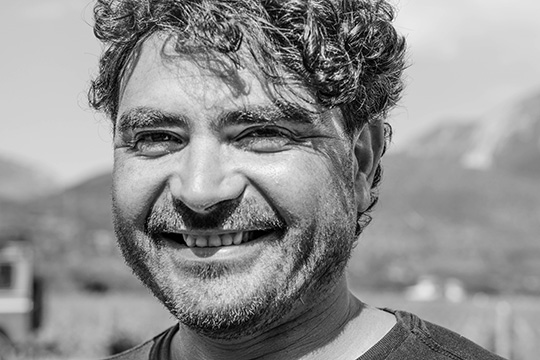
(Valle Reale winemaker Emmanuel Merlo photographed by Piers Parlett)
This type of soil affects very much the root apparatus of our vine. So, because it has a high drainage capacity, our soil, the water goes down very quickly, our vine doesn't have that much time to drink. So, she will develop a very broad, big and deep root apparatus that will go deep into the terrain to get as much water as she can. In this way, the nutrition power of course of this kind of root apparatus is fantastic, so the nutrition power to the grape is amazing.
But on the other side, of course there is the negative aspect, because if you have a very warming temperature and no rains, for sure in this part of the region our vines will suffer the lack of water.
If we talk about instead the soil in the coastal part, which is sandy soil with some clay, there the soil keeps the water for a long time. So the root apparatus will develop an umbrella-shaped kind of root apparatus. So the vines will have a lot of time to drink and the lack of water will be less of a problem.
For more on majestic wines of Abruzzo check out our interviews at Emidio Pepe, Cirelli.














